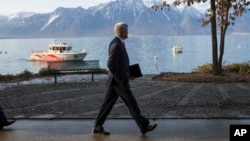U.S. Secretary of State John Kerry is traveling Wednesday to Saudi Arabia, where he will try to assure Gulf Cooperation Council (GCC) members that an Iran nuclear deal would not lead to regional instability.
Kerry and GCC foreign ministers will meet on Thursday at the Riyadh Air Base. The group includes the United Arab Emirates, Bahrain, Oman, Qatar, Kuwait and Saudi Arabia. Later Thursday, Kerry will hold talks with Saudi King Salman at his ranch northwest of Riyadh, and meet other officials, including the country’s foreign and interior ministers.
Kerry’s meetings with Gulf officials come at a time when Iran nuclear negotiators are nearing a critical deadline. Iran and the five permanent members of the U.N. Security Council and Germany, the so-called P5 + 1 are working against a self-imposed March 31 deadline to reach a framework agreement.
The secretary will travel to Saudi Arabia from Montreux, Switzerland, where he is holding three days of nuclear related talks with Iranian Foreign Minister Mohammad Javad Zarif.
Regional Powers Jittery Over Potential Deal
In a Tuesday briefing, a senior State Department official said “obviously, the Gulf states are watching the negotiations very carefully.”
The official said the U.S. has been extremely “forward leaning” in trying to explain its Iran nuclear strategies.
“But also to explain that this is not going to change any of the other aspects of our approach to Iran in regard to the other things that are of concern to the Gulf,” the official added.
Gulf state officials have expressed concern that a nuclear deal with Iran, which would end sanctions related to its nuclear program, could bolster Iran’s economic clout and its Shi’ite Muslim influence in the region.
Israeli Prime Minister Benjamin Netanyahu voiced similar concerns in a Tuesday speech to a joint meeting of the U.S. Congress. He claimed that Iran now “dominates” four Arab capitals - Baghdad, Damascus, Beirut and Sana’a.
“If Iran’s aggression is left unchecked, more will surely follow,” he said, as he laid out his opposition to an Iran nuclear deal.
The senior State Department official said regardless of nuclear developments, the U.S. will continue to “confront aggressively Iranian expansion in the region.”
Kerry, Zarif in Closed-Door Talks
The P5 + 1 negotiators are hoping to secure a final agreement by July 1 that would curb Iran’s paths to nuclear weapons. They are seeking a plan that includes limits on Tehran’s uranium enrichment levels.
During a break between sessions with Zarif, Kerry told reporters, “We’re working away, productively.”
Separately, Zarif said, "We are moving and we are talking to be able to make progress.”
Kerry, Gulf Leaders to Address Yemen’s Unrest
The senior State Department official said Kerry also will discuss Yemen’s unrest with Gulf officials. Shi'ite rebel Houthis seized control of the capital in January and placed U.S.-backed Sunni President Abed Rabbo Mansour Hadi under house arrest. Earlier this month, Mr. Hadi fled detention and went to a new base in the southern city of Aden.
The senior State Department official said U.S. ambassador to Yemen Matthew Tueller had a good meeting with the embattled president in Aden Monday. The official said Ambassador Tueller is establishing an office in Jeddeh, Saudi Arabia, “in order to be closer to the situation in Yemen.” In February, the U.S. suspended operations at its embassy in Sana’a, citing security concerns.
The official said Kerry and other officials will tell the GCC states that the U.S. believes the only way forward in Yemen is through a continuation of political negotiations that have been led by U.N. Secretary-General Ban Ki-moon and special envoy Jamal Benomar.
The U.N. has been working to get Yemen’s political parties to fully engage in talks. On Tuesday, Mr. Hadi suggested Riyadh as a possible venue for the resumption of the talks.
Concern about Islamic State in Iraq and Syria
Kerry and GCC state officials also are expected to discuss efforts to fight Islamic State militants in Iraq and Syria.
The senior State Department official said GCC states have been “strong partners” in efforts to combat IS, noting that Saudi Arabia had agreed to work with the U.S. in establishing a facility to train and equip Syria’s moderate opposition. The official said the facility will be launched in Saudi Arabia “in the coming months.”
After his talks in Saudi Arabia, Kerry is scheduled to meet with officials in London and Paris before returning to Washington.




